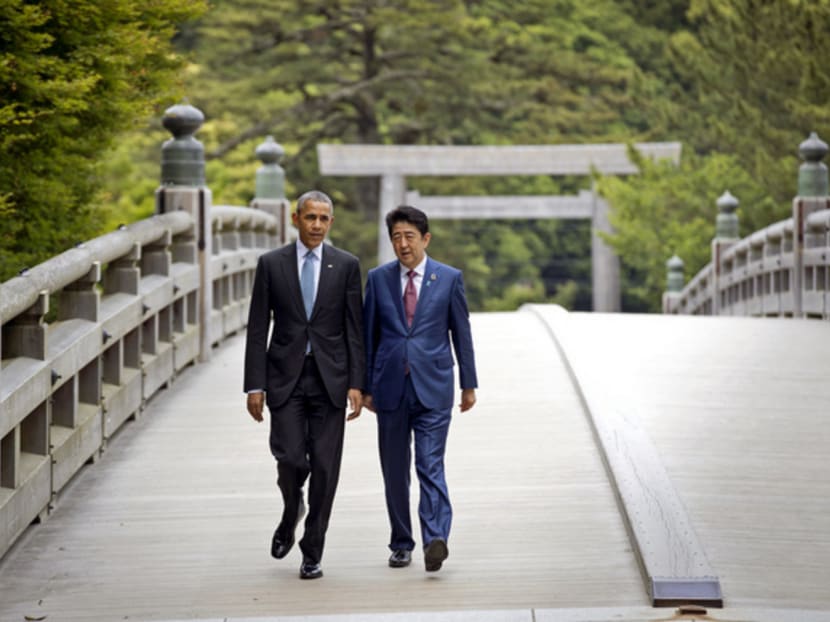Obama says North Korea’s nuclear ambitions a ‘big worry for all of us’
ISE-SHIMA (JAPAN) — United States President Barack Obama said yesterday that North Korea’s nuclear ambitions are a “big worry” that pose a serious medium-term threat, as tensions escalate following Pyongyang’s series of nuclear tests.

US President Barack Obama (left) and Japanese Prime Minister Shinzo Abe visiting the Ise Grand Shrine yesterday. Mr Obama said his historic visit to Hiroshima today will underline the dangers of warfare and the need to work towards peace. Photo: AP
ISE-SHIMA (JAPAN) — United States President Barack Obama said yesterday that North Korea’s nuclear ambitions are a “big worry” that pose a serious medium-term threat, as tensions escalate following Pyongyang’s series of nuclear tests.
“North Korea is a big worry for all of us. It is not the thing that poses necessarily the most immediate risk. (But) when you have such an unstable regime that is so isolated, that poses the kind of medium-term threat that we have to pay a lot of attention to,” he told reporters at a briefing on the sidelines of the Group of Seven (G7) nations talks, where North Korea’s nuclear ambitions and provocations are among the topics on the agenda.
However, he said engagement with China — North Korea’s main ally — and other countries had seen progress on the issue.
“It’s something that we’ve put at the centre of discussions and negotiations with China,” he said. “What we’ve seen is improved responses from China and countries in the region ... that may reduce the risk of North Korea selling weapons or missile material to other countries.”
The United Nations Security Council in March imposed tough new sanctions on North Korea in response to its fourth nuclear test in January and the launch of a long-range rocket in February. Even Beijing has been growing increasingly frustrated with the North’s nuclear ambitions, of which China disapproves.
Mr Obama also said his historic visit to Hiroshima today will underline the dangers of warfare and the need to work towards peace.
Mr Obama, who will become the only sitting US President to visit Hiroshima — the site of the first nuclear bomb attack — said it was “an inflection point in modern history”.
“It is something that all of us have had to deal with in one way or another,” he said.
Mr Obama said the bombing is no longer as present in the modern mind as it was during the decades of the Cold War. “But the backdrop of a nuclear event remains something that presses on the back of our imagination. I want to once again underscore the very real risks that are out there and the sense of urgency that we all should have,” he said.
The G7 talks were attended by leaders from the US, Canada, France, Germany, Great Britain, Italy and Japan. Despite reports indicating the issue of China’s growing assertiveness in the East and South China Seas will be discussed, the leaders were mostly silent on this yesterday.
The matter was only brought up by Japan’s Deputy Chief Cabinet Secretary Hiroshige Seko, who told reporters after a session on foreign policy affairs yesterday that G7 leaders agreed on the need to send a strong message on maritime claims in the western Pacific.
“(Japan’s) Prime Minister (Shinzo) Abe led discussion on the current situation in the South China Sea and East China Sea. Other G7 leaders said it is necessary for G7 to issue a clear signal,” he said. AGENCIES






